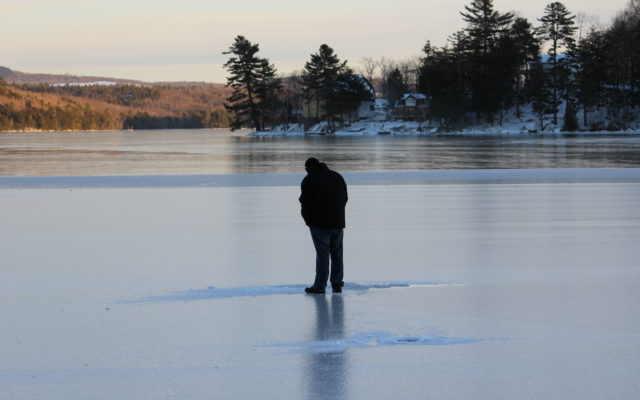
I’ve never met a fish worth dying for
By John Holyoke, Bangor Daily News Outdoors Editor
For several years, I’ve greeted all early season ice fishing invitations with the same response.
“Sorry,” I’ll say, “But I’m not really built for January ice fishing.”
Of course, the person issuing the invitation won’t have the foggiest idea what I’m talking about, so I get to deliver my punchline.
“You see, I’m pretty heavy, and I have tiny feet. According to the physics I learned back at Brewer High School, that means there’s a lot of pounds per square inch pressing down on that thin ice,” I’ll say. ” I’d clearly be the first to fall through. So thanks, but I think I’ll stay on dry land until we’ve got a solid foot or so of ice.”
Consider this my light-hearted attempt to broach a not-so-light topic.
In terms that are a bit more blunt, and more apt to catch your attention, let’s try it this way: When you’re done packing up your ice fishing gear for that trip to your favorite lake, answer a question for me: Do you really want to die this weekend?
I didn’t think so.
Still, chances are good that several anglers will fall through their barely frozen lakes and ponds this weekend, and will spend some time trying to swim in water that’ll be about 34 degrees. If we’re lucky — all of us, anglers and shore-standers alike — we won’t read about any of those incidents.
That’ll mean that everyone got out of the water alive. That’ll mean that my colleagues here at the Bangor Daily News won’t have to write another tragic story about someone losing their life while trying to enjoy a day of fishing. Already this week we’ve published a story about a man who was rescued after he fell through the ice while trying to rescue a struggling deer.
Yes, there are some safe places to fish. And yes, you might be one of those ultra-careful anglers who test the ice regularly, and who have fished the same piece of water for 30 years, and who knows exactly where it’ll be safe to go, even though we haven’t really had a long, severe cold snap that would create thick ice.
But there are plenty of others who aren’t that knowledgeable, nor patient, nor careful.
Here’s hoping they choose to make the right decisions, and exercise extreme caution.
Several years ago I hopped into the Atlantic Ocean in January to help raise money for a worthy cause. One year, the air temp was about 0 degrees, and a 30 mph wind blew across the beach. The water was a balmy 35 or so. And none of us polar dippers had any fun until we returned from the briny depths and huddled together in front of the bonfires that had been lit in our honor.
If we’d had to spend 20 minutes in that water, instead of 20 seconds, many of us would have been in serious trouble. As it was, when we ran, screaming, out of the water, our hair instantly froze, as did our swim trunks.
Those polar bear dips further instilled in me a good, healthy respect for (or fear of) cold water.
That respect, or fear, remains today.
I’m no ice expert, but I am an avid angler. I’d urge folks who insist on fishing early in the season to stay close to shore if possible, and to check ice regularly as they head farther out onto the lake or pond. The handheld ice picks can save your life if you do fall through. So can fishing with a buddy, who’d be there to offer aid.
Sometimes, I tell my stepkids and others, you only get one chance to make a stupid mistake. Sometimes, that mistake is your last.
In a rugged, rural state like Maine, we’re blessed to have lots of woods and waters to explore. Before you venture onto the ice in the coming days, here’s hoping you’re smart, and careful. And lucky.
As for me, I’ve never met a fish worth dying for. And I’m not about to go looking for one any time soon.
Be safe.
John Holyoke can be reached at jholyoke@bangordailynews.com or 207-990-8214. Follow him on Twitter: @JohnHolyoke. His first book, “Evergreens,” a collection of his favorite BDN columns and features, is published by Islandport Press and is available wherever books are sold.